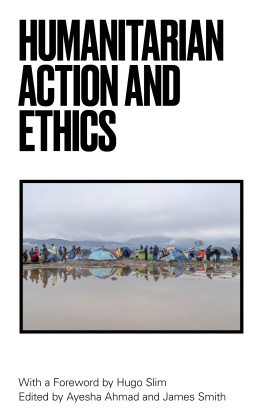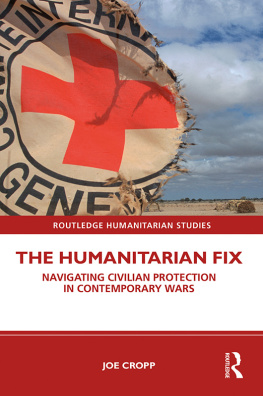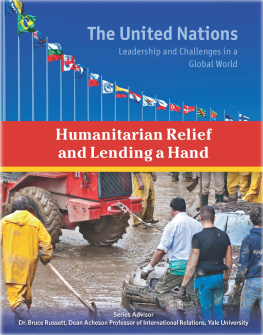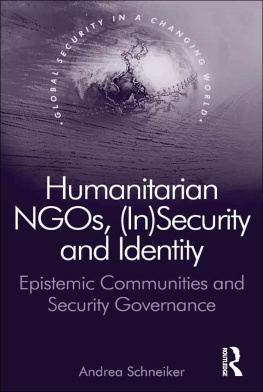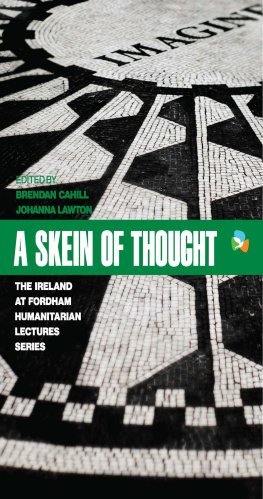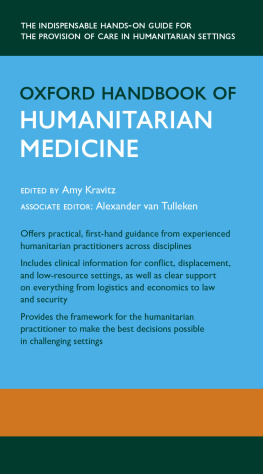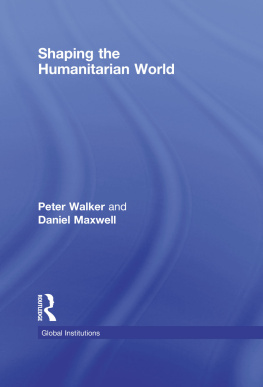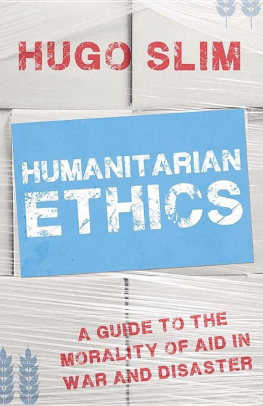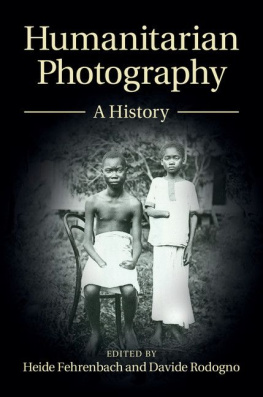More praise for Humanitarian Action and Ethics
An important and valuable book on the ethical challenges arising in humanitarian action. It highlights the complex range of challenges, while also presenting practical and constructive recommendations from authors who have worked on the front line of humanitarian crises.
Bayard Roberts, London School of Hygiene and Tropical Medicine
Powerfully depicts the ethical challenges pervading a world which deliberately generates so much human suffering through disasters and conflict. The chapters demonstrate what we can do to help, despite the moral entanglements of today's humanitarian labyrinth.
Ilan Kelman, Institute for Risk & Disaster Reduction, University College London
About the Editors
Dr Ayesha Ahmad is a lecturer in Global Health at St Georges University of London, and Honorary Lecturer at the Institute for Global Health, University College London. She specialises in gender-based violence and mental health in conflict and humanitarian crises.
Dr James Smith , MBBS, MSc, is a Research Fellow with the Health in Humanitarian Crises Centre at the London School of Hygiene and Tropical Medicine (LSHTM). He has worked as an advisor to MSF Operational Centre Barcelona (OCBA), and as a researcher with Mdecins Sans Frontires Research Unit on Humanitarian Stakes and Practices (UREPH), and continues to work as an emergency physician with the UK National Health Service (NHS).
HUMANITARIAN ACTION AND ETHICS
Edited by Ayesha Ahmad and James Smith
With a Foreword by Hugo Slim
Humanitarian Action and Ethics was first published in 2018 by Zed Books Ltd, The Foundry, 17 Oval Way, London SE11 5RR, UK.
www.zedbooks.net
Editorial Copyright Ayesha Ahmad and James Smith 2018.
Copyright in this Collection Zed Books 2018.
The right of Ayesha Ahmad and James Smith to be identified as the editors of this work has been asserted by them in accordance with the Copyright, Designs and Patents Act, 1988
Typeset in Plantin and Kievit by Swales & Willis Ltd, Exeter, Devon
Cover design by Burgess & Beech
Cover photo Andrew Testa/Panos
All rights reserved. No part of this publication may be reproduced, stored in a retrieval system or transmitted in any form or by any means, electronic, mechanical, photocopying or otherwise, without the prior permission of Zed Books Ltd.
A catalogue record for this book is available from the British Library
ISBN 978-1-78699-268-0 hb
ISBN 978-1-78699-267-3 pb
ISBN 978-1-78699-269-7 pdf
ISBN 978-1-78699-270-3 epub
ISBN 978-1-78699-271-0 mobi
CONTENTS
Hugo Slim
Vickie Hawkins and Paul McMaster
Ayesha Ahmad
James Smith
Matthew Hunt and Jingru Miao
Malle No
Katarna Komensk
Elisa Sandri and Fosco Bugoni
Jane Freedman
Celeste Cantor-Stephens
Kory L Funk, Diana Rayes, Leonard S Rubenstein, Nermin R Diab, Namrita S Singh, Matthew DeCamp, Wasim Maziak, Lara S Ho and W Courtland Robinson
Schlomit Zuckerman, Morshid Farhat and Salman Zarka
Jan Wrlein
Peter Hughes
Liyam Eloul and Claire F OReilly
Ayesha Ahmad
Vanessa Okito Wedi
Rachel Kiddell-Monroe, Carol Devine, John Pringle, Sidney Wong and Philippe Calain
Caroline Clarinval
John Pringle and Toby Leon Moorsom
James Smith
Ayesha Ahmad
The book has been a huge undertaking and most definitely a wonderful global and cultural experience. The desire to develop a book such as Humanitarian Action and Ethics has been longstanding, and I am thoroughly grateful for all of those who have helped bring an idea into reality.
I fundamentally need to thank Dr Donal OMathna, who provided the foundation for this book. I must also convey my gratitude to my Big Boss, Dr Carwyn Hooper, St Georges University of London, for the support, space and freedom to fulfil my academic dreams. I acknowledge with deep gratitude our chapter contributors for their gifts to our book, and my co-editor, Dr James Smith.
Finally, I give my eternal thanks to my parents for teaching me the importance of fighting for justice, morality, and equality, and especially to my father for encouraging me to break stereotypes quite a potent combination of skills for working in humanitarian settings. So many friends have supported me, as well as my dear sister Sara, the best 'chwaer. I cannot name all in person but they are always with me as I write. I hope that these words will not be the last words I give to them in a book.
James Smith
Foremost, I wish to express my thanks to Ayesha Ahmad, who not only extended the generous invitation to participate in this important project, but whose tireless desire to tackle injustice in every aspect of her work is a source of great inspiration.
I owe further thanks to Philippe Calain for his many insightful reflections, and for his continued guidance and encouragement. Many thanks are due to Amy Neilson, for similarly insightful reflections during the search for sense in the nonsensical, and for being a stellar physician particularly in those moments when it mattered the most. To Simukai Chigudu and Ahmed Khan, for their friendship and encouragement, I owe a great deal.
Finally, I wish to dedicate my contribution to this book to the memory of John Jal, a wonderfully kind and humorous man, whose commitment to the delivery of medical care, and his belief in the future of South Sudan, was evident in each and every one of the ward rounds we shared together. He is deeply missed.
Fosco Bugoni is currently enrolled on the first-level Professional Masters Programme in Migration Law and Policies at the University of Milano-Bicocca. He holds an MA in Anthropology and Ethnology from the University of Milano-Bicocca, and a BA in philosophy from the University of Milano-Statale. He is a volunteer with NAGA, a Milan-based non-profit organisation that provides legal advice and primary healthcare services for irregular third-country nationals. His research focuses mainly on migrations in the Italian context, particularly on the labour migration of Ukrainian domestic workers and on the role of small and medium-sized towns in the complex processes of integration of asylum seekers and refugees.
Philippe Calain is a medical doctor specialised in infectious diseases and tropical medicine. He also holds a doctorate in biology (virology). He has worked in Rwanda, Afghanistan and Laos, and is currently a senior researcher with the Research Unit on Humanitarian Stakes and Practices (UREPH) of MSF Switzerland. His research focuses on humanitarian medicine, public health ethics, global health governance, public health surveillance systems, pandemic preparedness and development theory.
Celeste Cantor-Stephens is an activist, researcherwriter, musicologist and musician, working in both English and French. She has been involved in the support of displaced people in various parts of France and the UK for several years. Celeste recently completed an MPhil at the University of Cambridge, with a thesis on human rights violations and the institutionalised abuse of exiled people at the FrancoBritish border. She is a performing musician, and has a special interest in the social, psychological and political roles of music in the world.
Dr Caroline Clarinval works at the World Health Organisations (WHO) Regional Office in Cairo. In her current role as Regional Adviser for Emergency Response and Operations, she is responsible for the WHOs emergency response and operations across the Middle Eastern Region. Prior to taking up her current post, she worked at the Federal Office of Public Health in Switzerland, as well as at the Institute of Biomedical Ethics at the University of Zurich. She also spent a decade abroad working for the International Committee of the Red Cross (ICRC) assisting populations affected by conflict.

